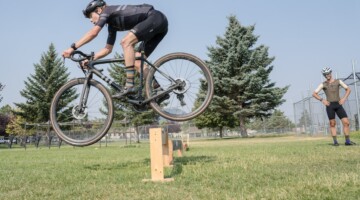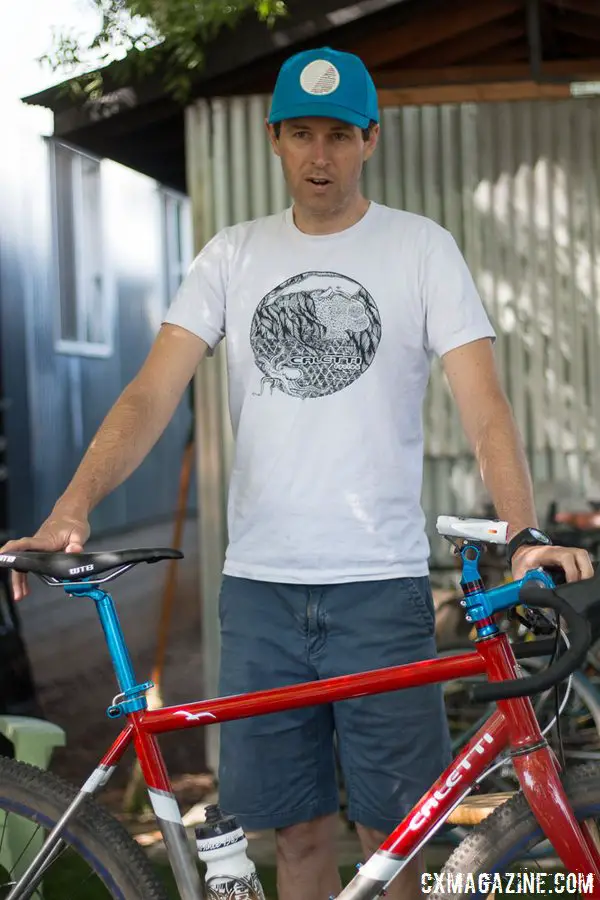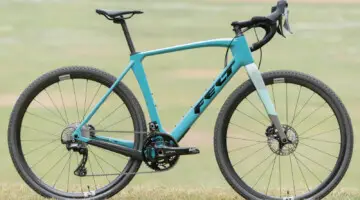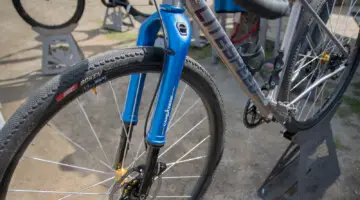We try to avoid mixing politics with cycling (although stay tuned for Q&A with USA Cycling cyclocross candidates who are campaigning for your vote), but with our recent trip to visit Paul Component Engineering in Chico for Paul Camp, we figured the 45th U.S. president’s declaration of this week being “Made in America” week is a good time to highlight some U.S.-made creations. Today we’re taking a look at a titanium monster cross creation we pushed through the rocks, dirt and gravel of Chico earlier this year.
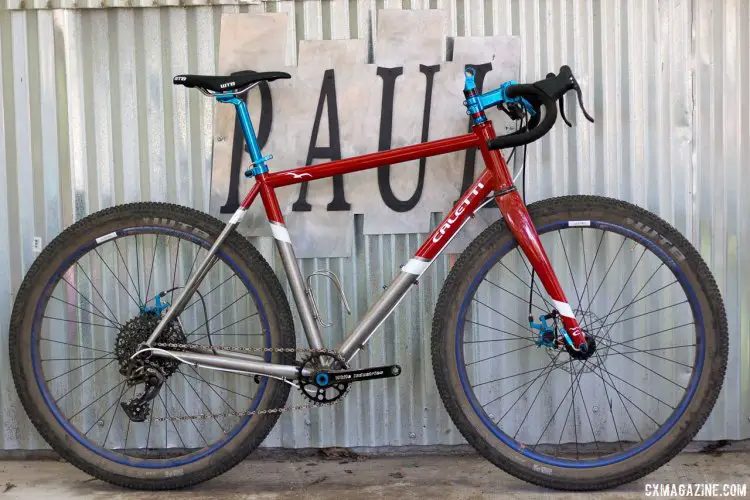
Made-in-America, with a plethora of American-made components. Caletti Cycles’ titanium monster cross bike. 2017 Paul Camp. © Cyclocross Magazine
Made in Surf City, USA
John Caletti, founder of Caletti Cycles, grew up riding bikes and tinkering in the family garage, so it was perhaps inevitable he would end up as a custom frame builder. Caletti learned the craft from Jim Kish, and then went on to establish Caletti Cycles in 2004 in Santa Cruz, CA.
Caletti Cycles produces made-to-order TIG welded steel and titanium bikes, and with the exception of a bit of part-time help, is mostly a one-man shop. Caletti is an avid off-road rider, and has several cyclocross and gravel-friendly builds to choose from.
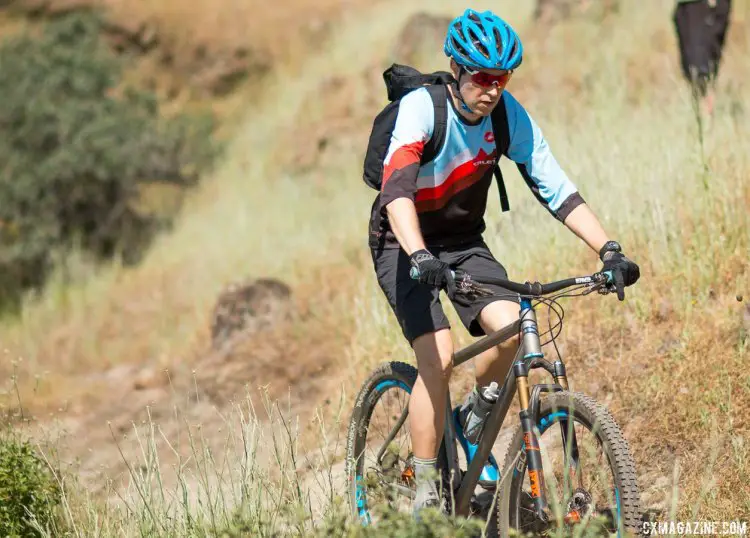
John Caletti climbs the rocky trails on his personal mountain bike at 2017 Paul Camp. © Cyclocross Magazine
Cyclocross Magazine has profiled Caletti Cycles’ bikes at the North American Handmade Bicycle Show in past years. Caletti’s own interest in off-road pathfinding has led the company to develop some versatile off-road offerings. Back in 2012, we had the opportunity to see the gravel-friendly Adventure Road Bike featuring a build that combines speed with durability and provides room for wider gravel-compatible tires. Caletti Cycles also makes a ‘’traditional’’ race-ready disc brake, thru-axle cyclocross bike.
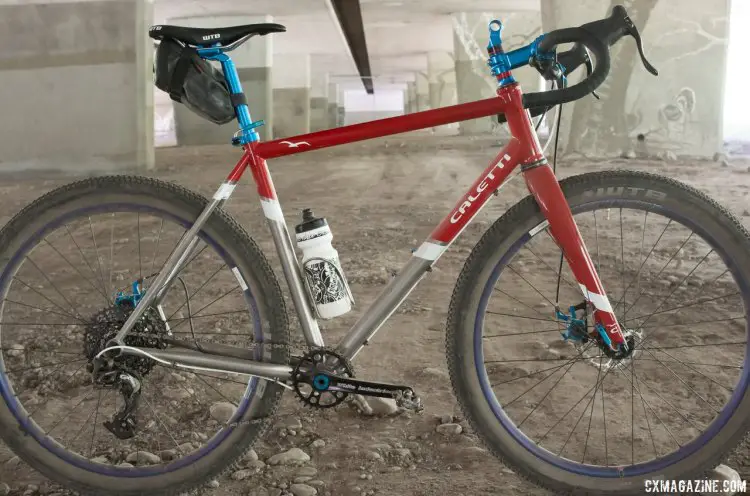
Cyclocross, gravel, and under-the-bridge dirt criteriums, Caletti Cycles’ titanium monster cross bike is built to do it all. 2017 Paul Camp. © Cyclocross Magazine
This spring, we threw a leg over one of his rides at Paul Camp—a titanium monster cross bike built specially for the camp—to sample his work and USA-made components from Paul Component Engineering, White Industries and Velocity.
A Far Cry from 90s Ti
Caletti hand picks the titanium tubing to build his frames, relying on titanium’s inherent ride qualities, but don’t expect this to ride like your dad’s whippy 90s Ti frame.
“It’s such a comfortable-riding material, that I find that people tend to notice the benefit of going a little bit larger in some of the tubes more than they would trying to go back the other way,” Caletti explains.
He tends to go larger on tube diameters, opting for a large 42mm down tube and 24mm chainstays, a little bigger than what he says is typical for the wonder material, but for a lighter rider or someone craving an ultra-smooth ride, he’d reduce tubing diameter in certain areas.
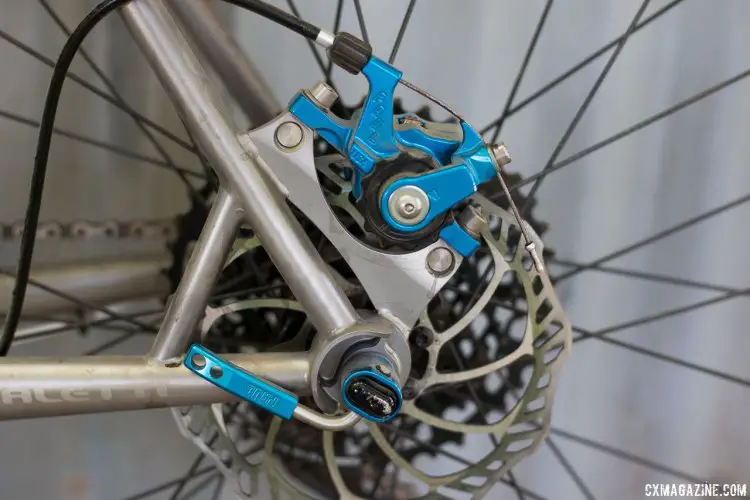
Caletti Cycles’ titanium monster cross bike paired Dedacciai 24mm chainstays with Paragon dropouts. 2017 Paul Camp. © Cyclocross Magazine
Caletti shops for his tubing based on his needs and specs, not by brand, but has been fond of Dedacciai titanium chainstays. He says they’re a bit softer and come pre-bent in S-bend shapes. For this monster cross build, Caletti added additional dimples for tire clearance.
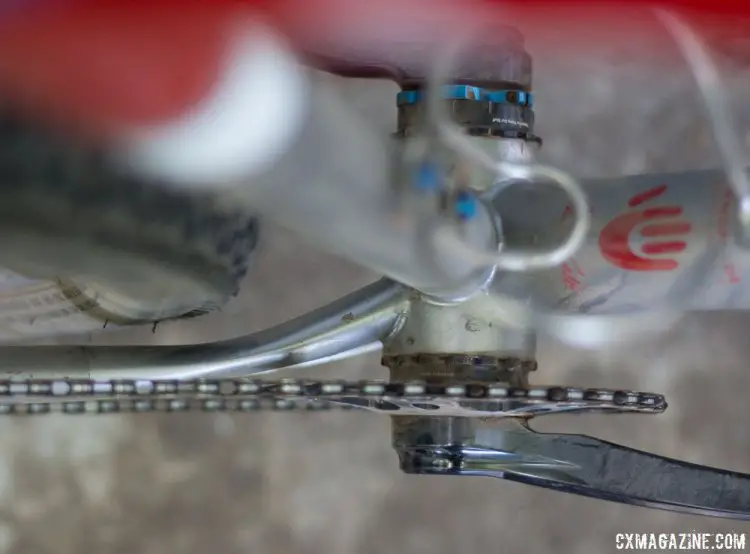
There’s plenty of tire clearance around the WTB 27.5×2.2 Bee Line rubber, with room for mud around 700c cyclocross tires should the owner go that route. Caletti Cycles’ titanium monster cross bike. 2017 Paul Camp. © Cyclocross Magazine
Caletti pairs his chainstays with a Paragon titanium dropouts, head tube and seat tube insert with 3/2.5 titanium grade nine, cold worked, stress-relieved straight gauge tubing to form his titanium framesets. Caletti also works in steel, but is building more and more titanium, with about 60% of his customers opting for the lighter metal.
“It’s such a comfortable-riding material, that I find that people tend to notice the benefit of going a little bit larger in some of the tubes more than they would trying to go back the other way.” -John Caletti
A Cyclocross Monster Mod
Caletti builds plenty of cyclocross and gravel (which he calls “Adventure Road”) bikes, typically cranking out one bike a week, but the monster Paul Camp request didn’t quite perfectly fit the jig for either of his cyclocross or Adventure Road categories of bikes. Caletti builds bikes to custom fit his customers, so it’s not like you can compare this to a stock model. He had a 5’10” rider in mind when building this 56cm (top tube) frame (Sounds like me, thankfully).
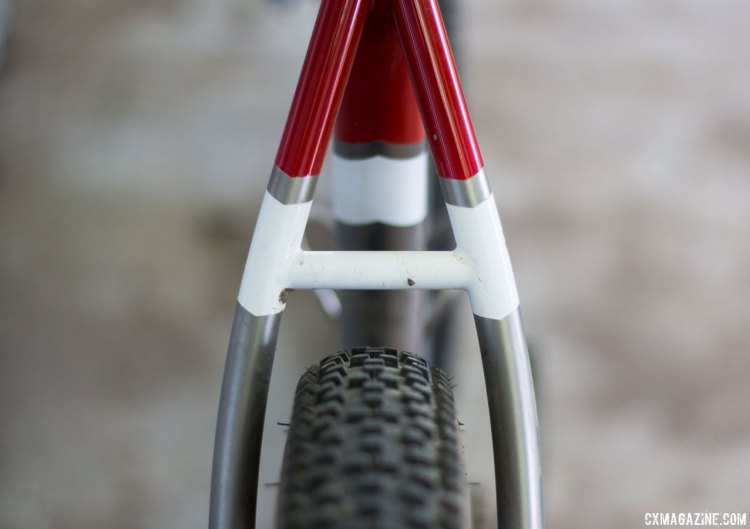
Caletti Cycles’ titanium monster cross bike features a clean seatstay bridge, but rack and fender mounts are an option. 2017 Paul Camp. © Cyclocross Magazine
The Santa Cruz-based builder said he stretched his chainstays a bit to fit the bigger 27.5 rubber (43cm, or 42.5cm effective/horizontal, 0.5cm longer than what he typically uses on his cyclocross builds). The bottom bracket drop, at 6.7cm, sits in between his typical gravel and cyclocross defaults. It’s also a bit longer that a traditional cyclocross bike to minimize toe overlap, with a slightly longer front-center at 61.7cm.
The rest of his frame sat right where many cyclocross bikes sit, with a 73.5 degree seat angle, 71 degree head angle, 160mm head tube, 61.7cm front center and an ENVE cyclocross fork with 395mm axle to crown and 47mm rake.
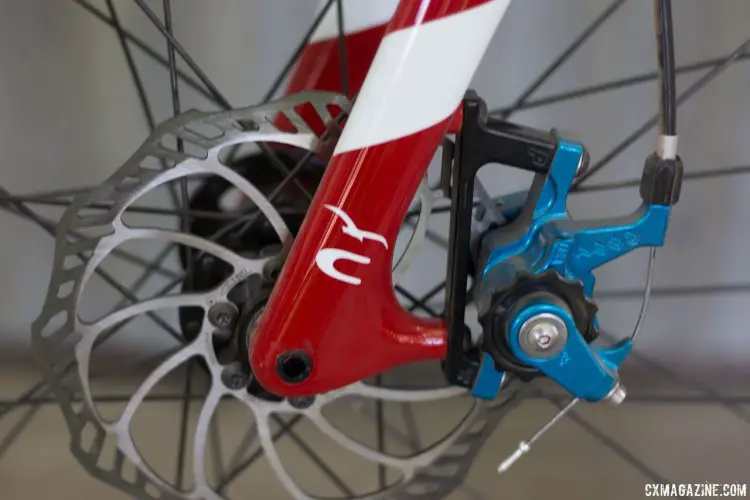
An ENVE Cross Fork coated with Dark Matter Finishing paint steered the Caletti Cycles’ titanium monster cross bike, while a Paul Klamper disc brake kept it under control. 2017 Paul Camp. © Cyclocross Magazine
While that geometry might seem pretty standard for a cyclocross bike, Caletti identified the details that might change for a dedicated cyclocross race bike. “For ’cross racing, we’d look to base it around a 700×35 tire, the chainstays might be a little bit shorter, the bottom bracket drop might be a little bit less,” he explains. “We’d probably do a little tighter front end, a little steeper head angle. This being a more off-road biased monster cross bike not really for racing, we want to try to add a little bit more stability so it handles the rough terrain well.”
Builders for Paul Camp were encouraged to use the T47 bottom bracket standard, and Caletti happily obliged, equipping his ride with a White Industries bottom bracket and modular crankset.
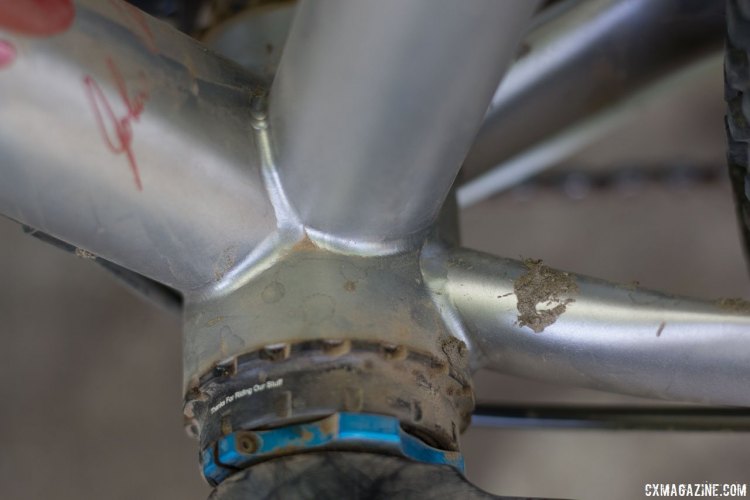
Caletti Cycles’ titanium monster cross bike featured a T47 threaded bottom bracket. Caletti’s titanium welds shine after media blast finishing. 2017 Paul Camp. © Cyclocross Magazine
Caletti works with both fitters and customers directly to determine an appropriate geometry for a customer. Once they pull the trigger, the wait is just a few months long.
His titanium cyclocross framesets start at $4195, which includes an ENVE fork, a Chris King headset and media blast satin finish. A steel frameset saves you $1k, at $3195. Paint, as shown on our demo bike, is extra, and starts at $575. The finish on our test bike was by Ollie of Dark Matter Finishing.
Rack, fender and electronic wire routing options are available for a nominal charge. The test bike featured down tube-routed rear derailleur cable routing, with nice, bolt-on cable housing clamps—no scratchy zip ties along the down tube—but if you’re going custom, perhaps springing for internal routing might minimize skinsuit sleeve snags on run-ups. Caletti aims to please.
A Chico Appetizer – Can I Have Seconds?
I’ve now sampled the trails of Chico all of five times. The first two servings were on a Paul Component-dressed Surly Straggler, once on a drop bar Falconer mountain bike, followed by a longer ride the next day on this Caletti (the fifth was with family).
I can’t profess to review a bike based on one ride on foreign trails, but can offer some impressions. The trails in Chico’s Upper Bidwell Park are rocky to say the least, and the 27.5 x 2.2″ rubber was a welcome layer of insulation between the rocky trail and my hands, feet and posterior.
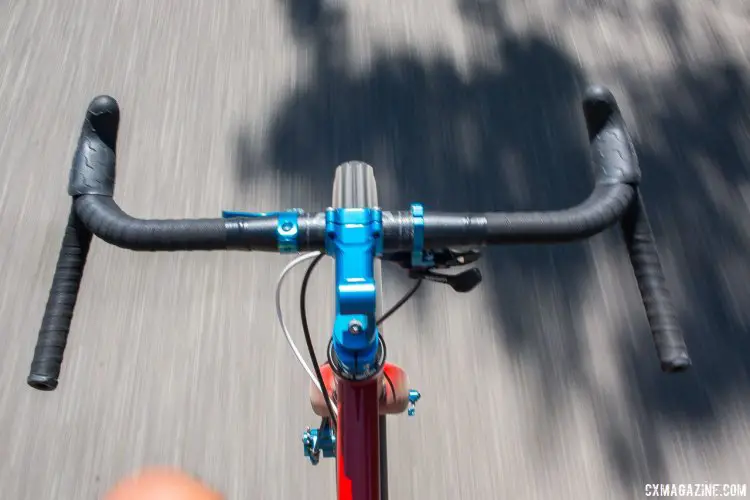
Caletti Cycles’ titanium monster cross bike offered a smooth ride on the dirt and gravel of Chico. 2017 Paul Camp. © Cyclocross Magazine
At slow speeds (which there was a lot of at Paul Component Engineering camp), especially on tight singletrack, the Caletti was a nimble star. At high speeds on rocky roads, the bike required a bit more attention than the bigger tire, longer, slacker Falconer that rolled over babyheads with ease. The comparison suggested to me the more-nimble Caletti would be an ideal do-it-all bike that would be quite at home out on the cyclocross course, gravel rides and races and on singletrack, more so than the Mount Huff killer Falconer built.
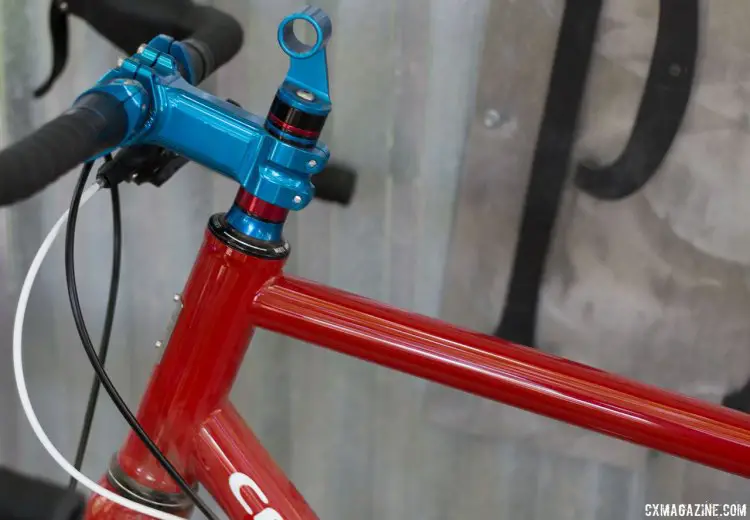
Caletti Cycles’ titanium monster cross bike with a White Industries headset, Paul Box Car Stem and Top Cap Light Mount. 2017 Paul Camp. © Cyclocross Magazine
In reality, my quick taste suggested that by embracing the dual 650b/700c wheel compatibility trend, Caletti built a bike that with two wheelsets, seems to be well-suited for year-long mixed terrai adventure and competitive racing with little compromise.
It wouldn’t be hard to find a dozen production cyclocross frames that share nearly identical geometry with Caletti’s monster cross frameset, and it would be fun to have more time on such a ride, including some spent on 700c cyclocross tubulars or tubeless tires.
That’s the downside of a quick taste of something nice. You want more.
More info: caletticycles.com
Caletti Cycles Monster Cross Photo Gallery:


